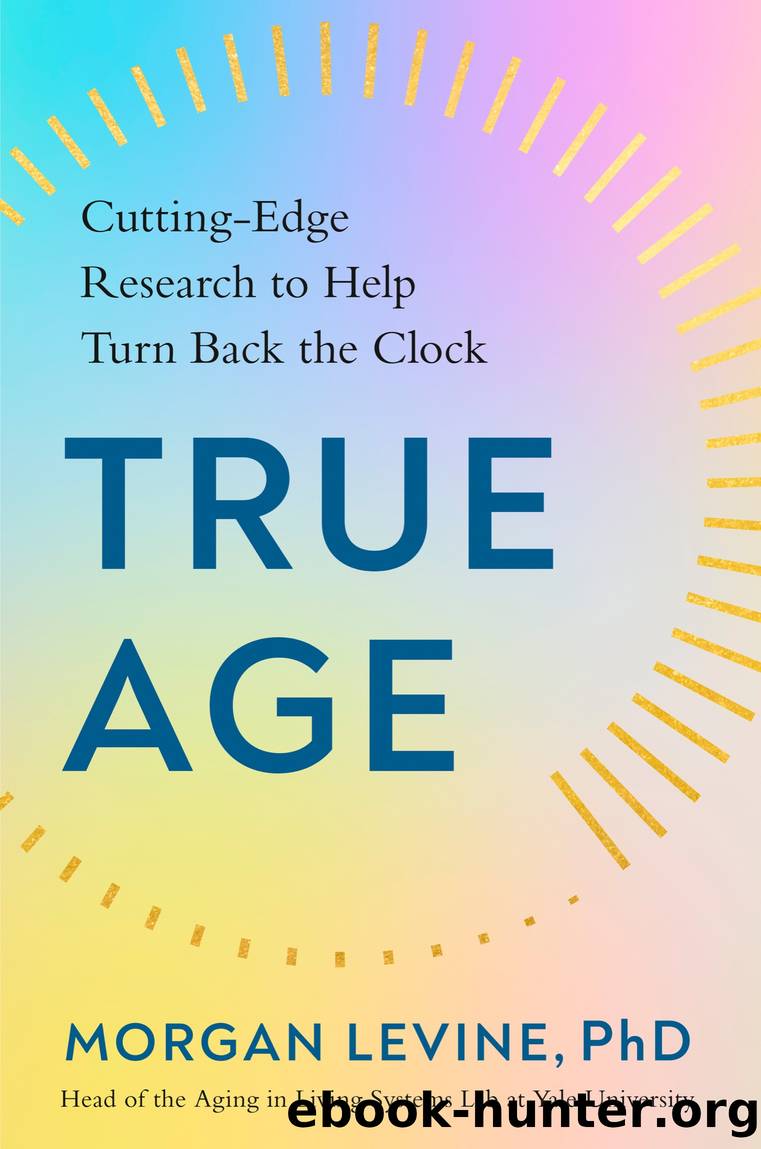True Age by Morgan Levine PhD

Author:Morgan Levine, PhD [Levine, PhD, Morgan]
Language: eng
Format: epub
Publisher: Penguin Publishing Group
Published: 2022-05-03T00:00:00+00:00
LET THEM EAT PLANTS
Since our study was published in 2015, a number of other scientific publications have come out touting the benefits of a plant-based or low animal protein diet. In general, most researchers in the field of aging would agree that in general a vegan diet is likely the best option for improving life span and healthspan. Nonetheless, as someone who follows a plant-based diet, I think it is also critical to acknowledge that there are healthy vegan diets and there are certainly unhealthy vegan diets. For instance, some of the most notorious junk foods are in essence vegan. Things like Oreo cookies, certain potato chips, some brownie or cake box mixes, Airheads candies, Hersheyâs Syrup, and Twizzlers. I doubt anyone would argue that a diet laden with these highly processed, sugary, and salty treats would buy them a longer life. Conversely, a diet composed of whole foods, including vegetables, seeds, nuts, legumes, and whole grains, has the potential to dramatically improve cardiometabolic health, reduce cancer risk, and promote longevity.
Up until very recently, ideas of veganism tended to elicit images of tree huggers and earth mothers, or perhaps card-carrying PETA members, but the plant-based lifestyle has now started to penetrate mainstream culture. A recent report showed that the prevalence of people who identify as being vegan increased 600-fold between 2014 and 2017. Moreover, the influx of meat alternatives have made even the most hardcore burger lovers take a serious look at plant-based living. This was also aided by the reports stating that adoption of a plant-based diet may be one of the most beneficial things an individual can personally do to fight climate change. Yet, despite the growing consensus regarding the benefits of going vegan, for many, this lifestyle still seems unfeasible.
Many people worry that forgoing meat will diminish their stamina and power. Even for those who pursue athletics recreationally, but especially for professionals who depend on their performance for their livelihood, the concern is always whether plants can provide enough fuel and muscle-building nutrients to keep someone at peak performance. Much of this, again, comes back to concerns over protein, given that protein serves as building blocks for our muscles. There is an inherent worry that vegans will need more protein to maintain the same level of performance as their meat-eating counterparts. The truth is, the amount of protein needed will be similarâthere are some differences in digestibility of plant versus animal protein, but that should only contribute to a negligible difference in what is absorbed. The more important thing is being strategic in what you eat and where your plant protein sources come from.
Proteins are made up of amino acids, many of which can be generated by our own bodies without the need to digest them. There are nine amino acids, referred to as âessential amino acids,â however, that we must get from our diet. Our bodies canât produce them on their own. These are histidine, isoleucine, leucine, lysine, methionine, phenylalanine, threonine, tryptophan, and valine. The protein
Download
This site does not store any files on its server. We only index and link to content provided by other sites. Please contact the content providers to delete copyright contents if any and email us, we'll remove relevant links or contents immediately.
Spare by Prince Harry The Duke of Sussex(5197)
Machine Learning at Scale with H2O by Gregory Keys | David Whiting(4313)
Fairy Tale by Stephen King(3399)
Will by Will Smith(2920)
The Bullet Journal Method by Ryder Carroll(2572)
Hooked: A Dark, Contemporary Romance (Never After Series) by Emily McIntire(2554)
It Starts With Us (It Ends with Us #2) by Colleen Hoover(2367)
Rationality by Steven Pinker(2364)
Can't Hurt Me: Master Your Mind and Defy the Odds - Clean Edition by David Goggins(2341)
Friends, Lovers, and the Big Terrible Thing by Matthew Perry(2230)
The Becoming by Nora Roberts(2202)
Love on the Brain by Ali Hazelwood(2078)
A Short History of War by Jeremy Black(1848)
HBR's 10 Must Reads 2022 by Harvard Business Review(1844)
The Strength In Our Scars by Bianca Sparacino(1843)
Leviathan Falls (The Expanse Book 9) by James S. A. Corey(1745)
A Game of Thrones (The Illustrated Edition) by George R. R. Martin(1745)
515945210 by Unknown(1667)
Bewilderment by Richard Powers(1620)
